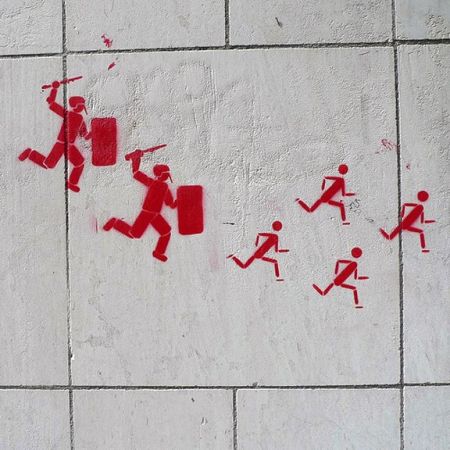After 14 weeks of student strikes in Quebec, the provincial Liberals announced tonight they will introduce a law that would suspend the semesters at colleges and universities if striking students do not stop holding picket lines or enforcing strike votes.
Student representatives were fast to denounce the regulation, calling it a "lock-out" and saying it will only add "fuel to the fire."
"Tonight, the government spit in the face of a generation...We will remember how we were treated tonight for a long time," said Gabriel Nadeau-Dubois, co-spokesperson for the Enlarged Coalition of the Association for a Solidarity Among Student Unions (CLASSE), at a press conference.
As the government's intentions became clear throughout the day, various voices spoke out against the government using legislating to deal with the conflict, including the Quebec Bar Association, and even a group of students which is actively mobilizing in favor of the tuition fee increase.
Over 155,000 students remain on strike in 14 colleges and 11 universities across the province. Since the government made its latest offer to students, some 325,000 have voted against it. It is the longest student strike in Quebec and Canadian history, launched in opposition to the provincial government's plan to increase tuition fees by 82 per cent over seven years.
Tonight's government proposal came in two parts:
At schools where students are on strike, students, administrators and teachers must come to an agreement that would allow any student who wishes to return to class - even those whose associations have voted in favor of the strike - to be able to do so. This includes putting an end to all pickets lines or any other disruptive tactics used to ensure the strike vote is respected. If such an agreement is reached, classes will continue normally for the remainder of the semester.
For those schools where such an agreement is not reached, classes will be suspended immediately, and will resume in August, with each school taking on the task of determining what the schedule should look like. The example of the Université de Montréal has been given, where winter semester classes are being suspended until mid-August. They will then run until the end of September. The Fall semester will begin at the start of October - a month late - and finish in mid-January.
The second part of the proposed law will serve to "guarantee the right to education," said the government in a release. It is believed that this means the government will introduce methods to enforce the ban on picket lines, possibly through major fines. The exact details will only be revealed when the bill is introduced in the National Assembly on Thursday.
Following the announcement, over 1,000 people took to the streets of Quebec City, while up to another 20,000 people marched in Montreal.
The effect of the law, said CLASSE, is essentially the same as a lock-out: at schools where students are still on strike, they either stop enforcing picket lines - eliminating any power that the strike may have - or they will see classes suspended, removing the element that they are striking against.
"This is a lockout, in the end, because it stops students from exercising their democratic rights in general assemblies," said Jeanne Reynolds, CLASSE's other co-spokesperson.
The Quebec Federation of University Students and the Quebec Federation of College Students also spoke out soon after the government announcement. They said that they are already preparing to launch a legal challenge against the legislation, should it be adopted. The Liberal party has a majority of seats in the National Assembly, so there is little doubt it will pass.
The proposed law comes as tensions have continued to rise on campuses. As the strike continues, more and more students have turned to the courts to seek injunctions allowing them to return to class, even if their student associations have voted by a majority to strike. In most cases, these injunctions have been approved since, while student unions are officially recognized under Quebec law, their right to collectively strike is not. Therefore the courts and the government see participation in the strike is a personal choice. The result is that if one student out of several hundred - or in some cases thousand - wishes to return to class, they have been granted an injunction to do so.
While the right of students to strike is not legislated, it has been accepted as a practice in the past. As court injunctions multiply though, striking students have taken action to protect the legitimacy of their strike votes. The result has been hard picket lines and classroom disruptions. In response, both local and provincial police have been dispatched to campuses, ratcheting up tension and resulting in arrests, injuries (often from batons), and tear gas and pepper spray being used.
"Each MNA who votes in favor of this law will have to live with consequences," said Reynolds. "Government intransigence has already seriously injured individuals."
CLASSE has called for a major demonstration in Montreal on May 22, two months after some 300,000 marched against the tuition fee increase, to show that the opposition remains.
What others are saying:
Amir Kadir, MNA for Québec Solidaire:
"Le gouvernement Charest n'a jamais voulu négocier véritablement avec un mouvement étudiant qu'il n'a cessé de ridiculiser, qu'il a sans cesse voulu marginaliser, dont il ne reconnaît pas le droit démocratique à s'organiser. Québec solidaire est, ce soir, plus que jamais, aux côtés des étudiantes et étudiants », a déclaré le député solidaire."
"Les propos de John James Charest, alias Jean Charest dit 'Le Petit', sont une attaque frontale du droit d'association et des droits sociaux. L'annonce d'une loi spéciale est une honte pour le gouvernement du Québec. Faire acte de solidarité c'est résister à la domination de la médiocrité marchande."
Au lieu de favoriser le dialogue, le gouvernement s'est entêté, n'a jamais fait le moindre compromis, a multiplié les déclarations insultantes et incendiaires, a minimisé l'importance du mouvement étudiant, a traité ses représentants avec condescendance, a nié la légitimité de leurs assemblées démocratiques et a encouragé l'abus des recours judiciaires.Le résultat est là, désolant : la démocratie étudiante est ravalée au rang de phénomène dérangeant au profit d'un parti qui exerce le pouvoir de façon autoritaire et inconsidérée.
Devant la gravité de la situation et compte tenu de la détérioration sociale,les professeures et professeurs d'université s'unissent pour oeuvrer à lasortie de la crise;ils dénoncent l'usage de la répression pour régler le conflit;ils exigent une participation importante aux décisions qui se rapportent àl'université.
« Quatorze semaines plus tard, avec le dépôt d'un projet de loi spéciale, nous reprochons au gouvernement libéral de dénier véritablement non seulement la réalité, mais la démocratie. C'est la démonstration de son incapacité de gérer convenablement une crise sociale. Nous croyons qu'au lieu de permettre d'éviter les perturbations, un tel geste envenimera encore plus le climat et accroîtra la division dans la population. Nous demandons au gouvernement, et à son premier ministre, de mettre son projet de loi sur la glace et de tout faire pour en arriver rapidement à un règlement négocié de la crise. Hier soir, cela semblait atteignable », de déclarer les présidents de la CSN, de la CSQ et de la FTQ.





